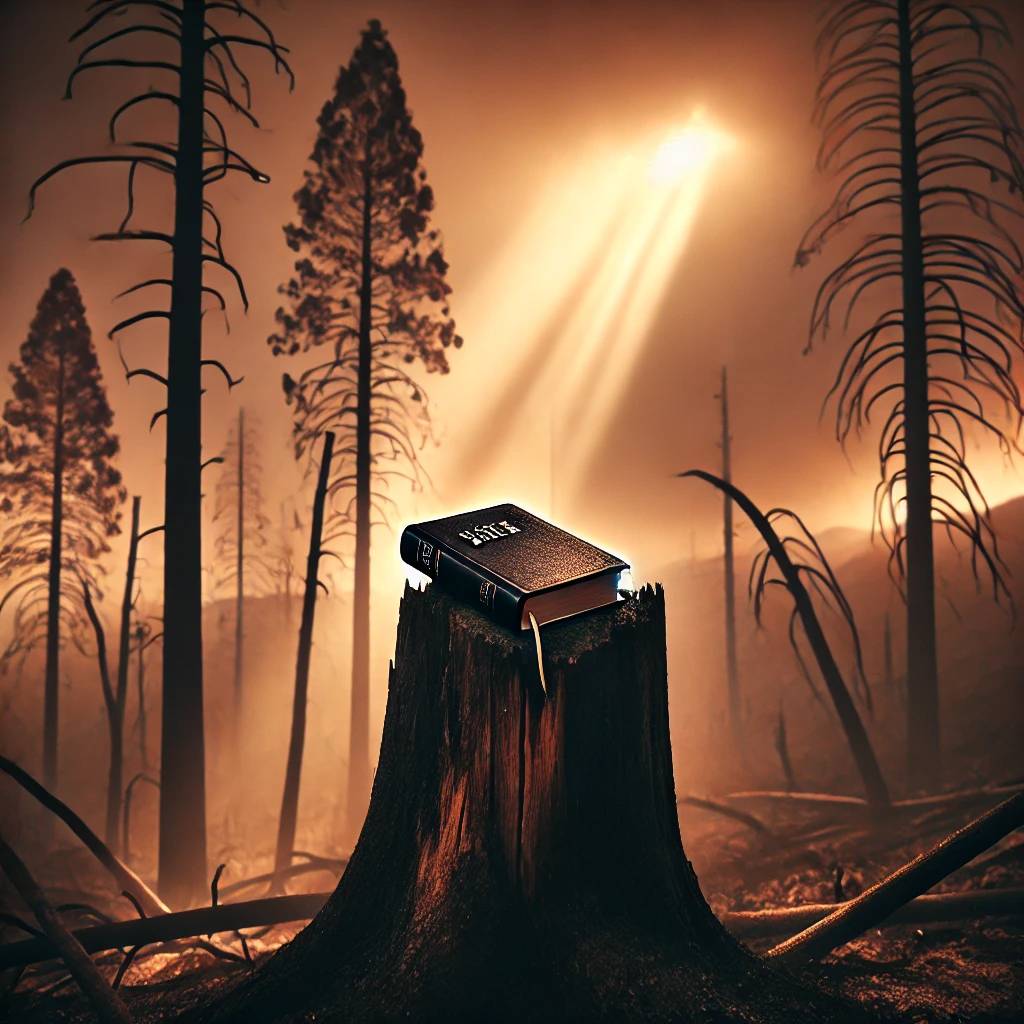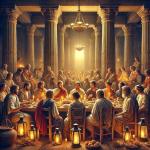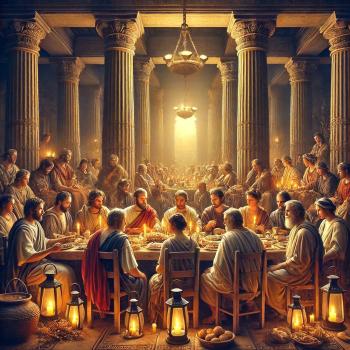
Standing in the Ashes
Appreciate that the grim statistics mentioned in this article are ever-evolving and quickly outdated as the news reports of the deaths and destructions of lives and prosperities in Southern California continue to pour in moment-by-moment. On Tuesday, January 14th, at 12:47 AM CST, the following release was issued by the NBC News online.
Santa Ana winds are set to cause critical fire conditions over the next three days across parts of Los Angeles and Ventura counties as the region continues to battle historic and deadly blazes. The wind-fed wildfires have killed at least 24 people and swept through 40,000 acres in the Greater Los Angeles area, destroying entire communities and more than 12,300 structures. The largest blaze, the Palisades Fire, has burned over 23,000 acres and was only 14% contained as it threatened Brentwood, Encino and Westwood. Evacuation orders are in effect for 92,000 residents of Los Angeles, and 89,000 are in evacuation warning zones, which means they may need to leave at a moment’s notice.
Cadaver dogs will be used to go through the devastation and ashes as heroic first responders and firefighters try to bring some measure of closure to the families teetering on the personal precipices of heartbreak frantically awaiting word concerning the missing. Every survivor grapples with their own grief and misery created by the sudden lost of loved ones; lifelong homes and possessions turned to cinders; being displaced from their homes and; priceless keepsakes only retained in the memories of those so devastated.
Hope Out of the Ashes
What word comes from God in times that impact those redeemed and those, yet, unredeemed equally pondering their losses on life’s journey? In our own private lives wherever we live, we all have and/or are destined to continue to stand over the ashes of what used to be with lost fortunes, severed relationships, broken health, and saying goodbye, it seems too often, to loved ones as we walk through the ever-growing family cemeteries plots. Is there no word from God when the fires of devastation sweep through our lives reducing those closest to us to ashes?
Hope Secured, or Hope Available
Although the following words of hope apply only to the blood-washed, Holy Spirit indwelt members of Christ’s Eternal Kingdom (His Spiritual Body), this same Christian HOPE is extended to everyone on Planet Earth from the God of the Universe who is calling all humanity back into His fellowship through Christ’s shed blood activated by the indwelling of the Holy Spirit.
https://www.biblegateway.com/passage/?search=2%20Peter%203%3A9&version=NASB
In 55 A.D. roughly eight years before he would be beheaded by the bloody despot, Nero, in the city of Rome, Paul wrote these words of hope to his Corinthian brothers and sisters in Christ that resound through the ages extending unassailable hope to the people of God of all the ages.
For we know that if our earthly tent which is our house is torn down, we have a building from God, a house not made by hands, eternal in the heavens. For indeed, in this tent we groan, longing to be clothed with our dwelling from heaven, since in fact after putting it on, we will not be found naked. For indeed, we who are in this tent groan, being burdened, because we do not want to be unclothed but to be clothed, so that what is mortal will be swallowed up by life. Now He who prepared us for this very purpose is God, who gave us the Spirit as a pledge.
Earthly Tents
The earthly tents concerning which Paul wrote were his and fellow Christians’ physical bodies—the physical house of the human spirit. These physical bodies, or houses will soon, in Paul’s metaphor, be torn down at the death of the Christian. The phrase, Torn Down (Gr., KATALUO) has a powerful etymology brimming with Christian hope. KATALUO (torn down) paints a picture of travelers coming to a halt on their journeys and then being put up for the night resulting in their garments that had been tied up, or (with which they were clothed) being at the end of their journey unloosed.[4] Notice Paul’s inspired and brilliantly switching of the metaphors from one’s earthly tent, to one’s earthly garments—both figuratively referring to a Christian’s physical body.
Excitement of Moving Day
Christians abide in their houses (physical bodies) while still living. As a Christian’s faith grows to greater and greater heights fed constantly on the written word of the living God, moving day from their clay houses is looked forward to with the greatest of anticipation and readiness. When Paul wrote to his Philippian brothers and sisters during his first Roman imprisonment, he expressed his deepest desire saying, having the desire to depart and be with Christ. Looking forward to moving day seems so strange to those who have no hope beyond their existence in their earthly tents, but the Christian hope revolutionizes one’s entire perspective in this world looking forward to the world to come.
Groaning in Our Tents
Yet, Christians are all too familiar that while in their earthly tents, we groan (Gr., STENAZO) meaning we are something in straits sighing, murmuring inaudibly, and grieving.[7] Paul’s metaphor of our physical bodies being earthly houses or earthly garments makes the reader illuminated by the Holy Spirit to make the applications. Houses can and do deteriorate into ill-repair and run down and garments inevitably become old, moth eaten, and ripped. Hence, in these earthly houses, or garments, all human beings (especially when we are standing in the ashes of our broken health, destroyed possessions, lost fortunes and/or the deaths of one loved ones) are subjected to human groanings—yes, including Christians who are not spared the sufferings along life’s journey.
King Solomon: Before the Evil Days of Groaning
A classic example of the groanings of a physical body—an earthly house while still wearing his earthly garments—was the life, wisdom, fortunes, power, and physique showcasing the life of King Solomon in biblical history.
Due to his God-given wisdom, he became one of the most powerful men on earth possessing a wisdom like no one before him, or after him, except Jesus, himself. His wisdom extended to every area of life under the sun, including zoology, biology, botany, government, and all dynamics of the physical laws of the earth. Because of his unsurpassed wisdom, he became the wealthiest man on earth. All earthly pleasures were enjoyed by him to the extreme: the most fabulous foods; sexual pleasures with 700 wives and 300 concubines; various groups of musicians and singers were at his beckoned call to sing and play his favorite songs.
When he married his 80th wife, a poor Shulamite woman who was a grape picker in her brothers’ vineyard with a low self-concept, the Book of Song of Solomon he penned by inspiration details their meeting, courtship, marriage, and honeymoon. Jewish adolescents were not allowed to read this candid account before a certain age due to its poetic and metaphoric descriptions of virginity during courtship and intimacy after marriage.
Solomon wrote of their honeymoon night when his new wife described his body as he did hers. His Shulamite wife marveled as she described her husband’s earthly tent, or house in the days before the evil days of groaning and debilitation of old age arrived. While he was strong and fit, she marveled at her beloved saying he was dazzling and reddish, outstanding among ten thousand. Continuing, she compared his: head to pure gold; eyes as white doves as if bathed in milk and well hydrated; cheeks like a bed of balsam; lips like lilies dripping drops of myrrh; hands as rods of iron set in topaz; abdomen as panels of ivory covered with sapphires; thighs as pillars of ivory set on pedestals (hips) of pure gold. Concluding her amazement, she summarized by saying his appearance was like Lebanon, choice as the cedars. It would not have been surprising if Solomon had a state-of-the-art gym right on the premises of his house—he had everything else one’s heart could desire under the sun.
King Solomon: Time of the Evil Days of Groaning
Such is the plight of all the descendants of the First Adam. At the Fall of Adam due to eating of the forbidden tree in the Garden of Eden, God pronounced a curse upon him which would pass onto all his future descendants (all humankind), saying, Dust you are and to dust you shall return. Physical death due to Adam’s sin is that to which the Apostle Paul refers when he wrote, For as in Adam all die, so also in Christ all will be made alive. Hence, toward the end of Solomon’s life, he bemoans his tent, or house (his physical body as it deteriorated) nearing the time to be TORN DOWN with his garments of the flesh being taken off at the end of his life as his spirit returned to the God who made it.
King Solomon died at the age of eighty in 931 B.C. and his once athletic body had deteriorated over the years. In old age, he wrote of various limitations and physical inabilities that once were strong and keen, but entirely weakened, or no longer existent in his old age. In the inspired poetry of the metaphoric, he spoke of: (1) having no pleasure in his old age; (2) failing eyesight; (3) one physical trouble following another; (4) trimmers, possibly Parkinson’s Disease; (5) a bent back—kyphosis; (6) loss of teeth and difficulty chewing; (7) progressive loss of hearing; (8) insomnia; (9) loss of balance; (10) vulnerability; (11) black hair turned white; and, (12) sexual impotence. The aged Solomon groaned as he summarized his days as an old, infirmed man comparing himself as the grasshopper drags itself along. Even with life lived to the fullest in his earthly tent, in his old age he finally realized that all those pleasures and possessions were nothing more than the futility of futilities. Turning his dimmed eyes toward heaven and bowing his weakened frame before God, he wrote, Remember your Creator before the silver cord is broken and the golden bowl is crushed, the pitcher by the spring is shattered and the wheel at the cistern is crushed; then the dust will return to the earth as it was, and the spirit will return to God who gave it.[16]
Hope Springing Out of the Ashes
Approximately 986 years later and inspired by the Spirit of God, the Apostle Paul pondered his earthly house being torn down as delivered words of overwhelming hope wrote, For we know that if our earthly tent which is our house is torn down, we have a building from God, a house not made by hands, eternal in the heavens.
But, at the end of our Christian journeys at death, the picture is that the garments of our physical bodies are loosed at the end as our spirits go home to Paradise with Jesus. The redeemed spirits having been made perfect in the blood of Christ are temporarily loosed as they go home to Jesus, but the earthly tent will not remain in the grave! Paul reminds his Corinthian Christian readers that the mortal (earthly tent) will be swallowed up by life! SWALLOWED UP (Gr., KATAPINO) means to devour, to drink down, swallow down, to destroy.[18]
What will be destroyed? DEATH WILL BE SWALLOWED DOWN AND DESTROYED AT THE FINAL COMING OF CHRIST.[19] This is exactly what Paul meant when he wrote to the same Corinthian Christians in the I Corinthians epistle, Death has been swallowed up in victory. Where, O Death, is your victory? Where, O Death, is your sting?[20] This is the glorious reason Paul concludes words of HOPE to Christians in our darkest days as we stand over the ashes of deceased Christian brothers and sisters writing, Now He who prepared us for this very purpose is God, who gave us the Spirit as a pledge. The gift of the Holy Spirit to indwell the EARTHLY TENTS (the physical bodies) of the repentant, baptized believers in Jesus’ deity, death, burial, and resurrection was given to us as a PLEDGE. The word, PLEDGE (Gr., ARRHABON) means downpayment (guarantee) that the full amount will subsequently be paid.[21] Christians’ spirits have already been made perfect in the blood of Jesus,[22] but our sin-cursed earthly tents from which those redeemed spirits are loosed at death will, also, be redeemed from our graves at the final coming of Christ! How can we know this is true? Because God pledged, or guaranteed the full amount of total redemption will be paid when our earthly tents are raised, glorified being made immortal and incorruptible. Writing of the resurrection of saints, Paul wrote:
Behold, I am telling you a mystery; we will not all sleep, but we will all be changed, in a moment, in the twinkling of an eye, at the last trumpet; for the trumpet will sound, and the dead will be raised imperishable, and we will be changed. For this perishable must put on the imperishable, and this mortal must put on immortality. But when this perishable puts on the imperishable, and this mortal puts on immortality, then will come about the saying that is written: “Death has been swallowed up in victory.
No California wildfires, worldwide tsunamis, atomic bombs, nor the debilitations of growing old can possibly cause Christians to stand over their ashes in this present world without hope!
Paul Phillips writing for Apologetics Press wrote of the agnostic Robert Ingersoll (1833 – 1899). Phillips notes that Ingersoll was one of the most famous orators and agnostics of the latter nineteenth century in America. The son of a circuit preacher, he said he had faint recollections of hating Jehovah as a small child. After hearing a preacher speak on the subject of the Rich Man and Lazarus with the reading of the rich man’s eternal destiny being in hell in torment, he was quoted as saying, For me, on that day, the flames of hell were quenched.
He doubted the existence of God and did not believe in the inspiration of the Bible.[25]
Yet, when faced with one of his most desperate hours, he was called upon to deliver the eulogy at his beloved brother’s grave in Washington D.C. in 1879. Here is an excerpt from that eulogy.
Life is a narrow vale between the cold and barren peaks of two eternities. We strive in vain to look beyond the heights. We cry aloud, and the only answer is the echo of our wailing cry. From the voiceless lips of the unreplying dead there comes no word, but in the night of death, hope sees a sta,r and listening love can hear the rustle of a wing.
He who sleeps here, when dying, mistaking the approach of death for the return of health, whispered with his latest breath, ‘I am better now.’ Let us believe, in spite of doubts and dogmas, of fears and tears, that these dear words are true of all the countless dead.
As people in mortal flesh, we are all destined to continue to stand beside and, ultimately, become the ashes that Robert Ingersoll spoke over in 1879 and became himself in 1899. In our darkest hours, will we be standing straining to hear the rustle of an angel’s wing, or blinking to see some distant star of hope into deep space, or will we have based our hope on the promise of Jesus Christ who promised at the tomb of Lazarus before He raised him from the dead, I am the resurrection and the life; the one who believes in Me will live, even if he dies.[27]
___
References
[2] John 10; 2 Peter 3:9, NASV.
[4] Joseph Henry Thayer via E-Sword Extreme for Mac.
[7] Strong, https://www.blueletterbible.org/lexicon/g4727/kjv/tr/0-1/
[18] Joseph Henry Thayer via E-Sword Extreme for Mac.
[19] I Corinthians 15:50-59; I Thessalonians 4:13-18; Philippians 3:20, 21; John 11:25
[20] I Corinthians 15:54b, 55, NASV.
[21] Joseph Henry Thayer via E-Sword Extreme for Mac.
[22] 2 Corinthians 5:21; Romans 1:16, 17; 3:21-25a, NASV.
[23] I Corinthians 15:51-54, NASV.
[24] Farrell, Clinton P., ed. (1900), The Works of Robert G. Ingersoll (New York: C.P. Farrell), quoted by Paul Phillips, https://apologeticspress.org/robert-g-ingersoll-the-great-agnostic-603/
[27] John 11:25, NASV.
















